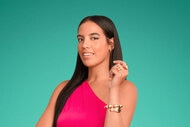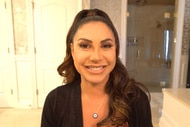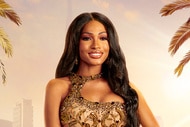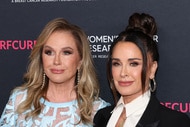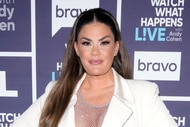
Create a free profile to get unlimited access to exclusive videos, sweepstakes, and more!
7 Gray Hair Myths Busted by Pros
Signs of gray hairs should not be cause for panic. Here's what you need to know.

Taxes and gray hair: two inevitabilities that affect us all. While taxes would only ever bring joy to a masochist (and the IRS), that silver crown is actually a privilege, considering the alternative. Still, the sight of sparkling tinsel upon our heads tends to breed a real (and unnecessary) horror, and exacerbating that fear is a bounty of misinformation about gray hair.
With the help of experts, we're setting the record straight on seven of the most common myths out there.
Myth #1: Only Older People Get Gray Hair
“Although most individuals begin seeing gray hair in their 30s, gray hair has been known to appear in some teens,” said Austin Medearis, a master colorist at NYC’s Butterfly Studio Salon, who’s worked with Bella Hadid, Lupita Nyong'o, and Jordan Barrett.
He said that when you begin developing gray hair is primarily based on your genes. For some, that can be as late as your 60s, but for others, it can be as early as high school. He added, “Certain medical conditions can cause early onset, such as anemia, diabetes, and thyroid disorder.”
Myth #2: Plucking One Gray Hair Leads to Two More
It’s time to retire this old wives’ tale for good. Plucking one hair on your head will not lead to the sudden growth of two more. Medearis said, "I have no idea where this myth came from, but it’s clearly not from a medical or haircare professional."
This is purely speculative, but perhaps the myth was created to be a sort of plucking deterrent considering how tempting it is to yank gray hairs and how damaging the act can be.
"Plucking gray hair over and over can traumatize the hair follicle, cause infection, and increase the chances of producing a bald spot,” Medearis warned.
Myth #3: Gray Hair is Always Coarse
Perhaps one of the scariest aspects of going gray is worrying about a change in texture. It takes some of us decades to get a handle on which products to use and how to style our hair, and a forced change that upsets all that hard work doesn’t sound like any fun. However, coarse, gray hair isn’t the default.
“Not all gray hair feels coarse. Gray hair is caused by melanocytes, which produce melanin (pigment), dying. That just means it will no longer produce color,” Ebony Bomani, a master cosmetologist and educator at The Mane Choice, explained. She added, “The same factors that cause hair to lose its melanin also causes the sebaceous glands at the base of the hair follicle to become less productive.”
Because there’s a decrease in natural oil production, gray hair does have a tendency to become dry, brittle, and yes — coarse. However, following a good haircare regimen, using the right products, and eating well/taking supplements can help nourish gray hair so it’s soft and strong.
A diet that’s rich in protein, iron, and essential fats is a good place to start. Staying hydrated, exercising regularly, using moisturizing conditioners and washes, and performing scalp massages with oils can also help keep gray hair soft and shiny, according to Medearis.
Myth #4: Gray Hair Doesn’t Grow Long
As we age, hair growth does slow down, but it doesn’t halt. In fact, Medearis said he has plenty of mature clients with full heads of hair. Again, it’s important to follow a routine that nourishes your scalp and hair from the inside out. There are also hair growth treatments — including the two common drugs Finasteride and Minoxidil — that can help bolster hair loss. In terms of supplements, biotin, copper, zinc, vitamin A, and B vitamins are all highly recommended for promoting hair growth and density.
Myth #5: Stress or “Fright” Leads to More Gray Hair
That image of being so scared your hair turns white? Not a thing. Your hair won’t turn gray overnight, and a single stressful event isn’t going to cause white hairs to sporadically sprout from your head.
There’s still research being done on how ongoing, deep stress and anxiety can affect the body — and by extension, aging-related symptoms like gray hair — but there’s no definitive science that says long-term stress outright causes gray hair.
Meditate, exercise, reduce your work-load, learn to say no, and take some you-time because you deserve it, though.
Myth #6: You Can’t Color Gray Hair
“There are a myriad of products and colorants that can handle whatever gray hair can throw at it,” said Medearis. “Speak to a well-educated, well-trained stylist or colorist to meet whatever your haircare concerns are.”
On that note, let’s bust the myth that says coloring your hair causes more gray hairs to appear. Medearis insisted that’s flat-out wrong and reiterated that “gray hair is a product of internal factors.”
That said, in the same way that over-coloring can damage non-gray hair, it can also cause gray hair to become more brittle and parched. That’s why it’s important to take proper care of dyed hair and to have professionals tend to your locks.
Myth #7: You Can Reverse Gray Hair
Sorry to bust your hope bubble, but science isn’t quite there yet when it comes to gray hair reversal. There’s still work being done on this, and it’s somewhat promising, but at this point you shouldn’t buy into products or old wives’ tales that promise to reverse your grays.
Instead, avoid things that have been known to increase gray hair — such as smoking and low-levels of B12 — and focus instead on nourishing your existing gray hair with moisturizing products.






